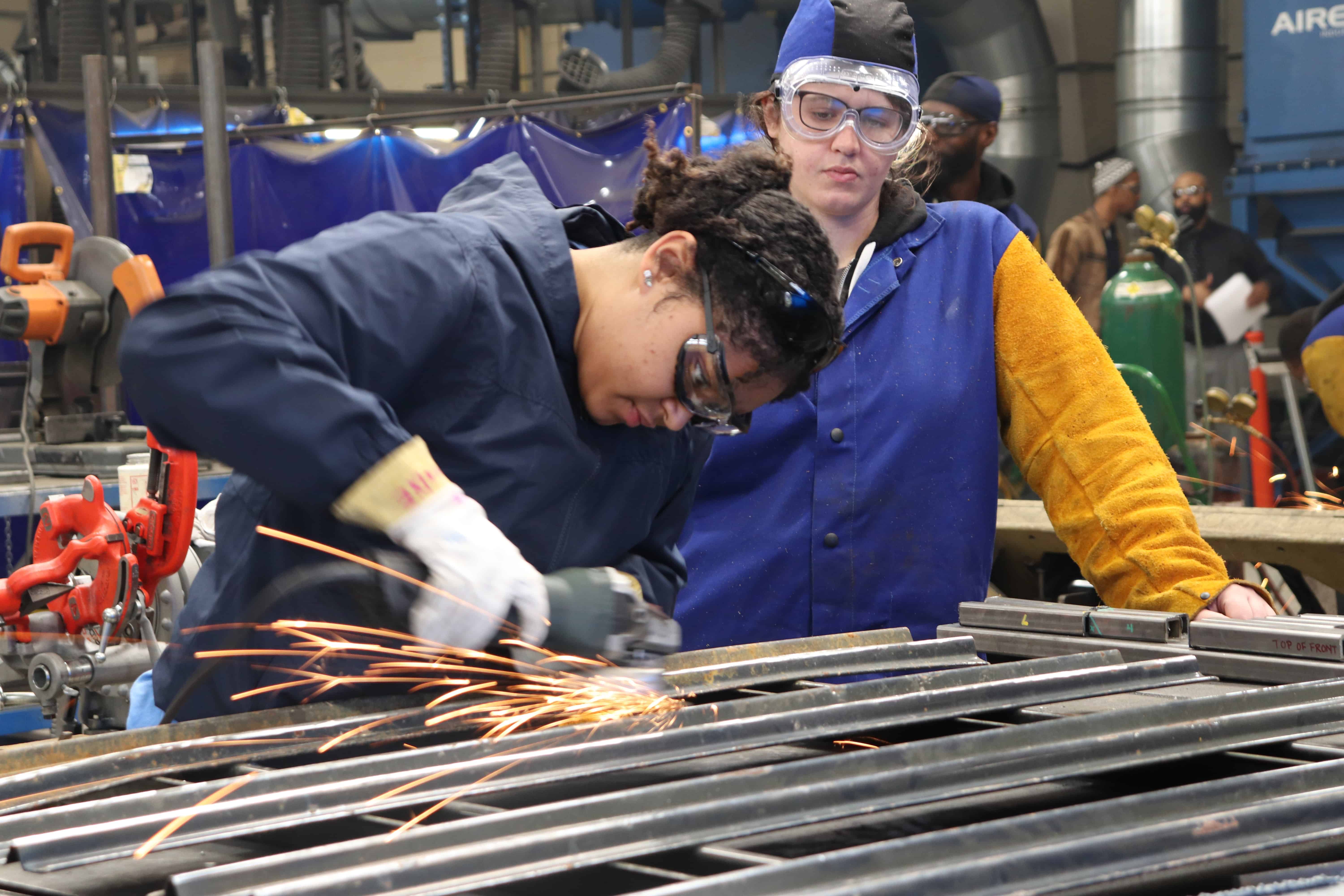Skilled trade jobs are increasingly in demand as industries face labor shortages driven by retiring workers and growing reliance on specialized skills. These careers provide excellent opportunities with minimal schooling compared to traditional four-year degrees. Whether you’re interested in construction, healthcare, or industrial work, these skilled trades can offer lucrative, secure, and rewarding careers.
| Trade Job | Average Salary (per year) | Training/Education Time |
|---|---|---|
| Electrician | $60,040 | 1–2 years |
| Welder | $48,290 | 6–12 months |
| Machinist | $45,840 | 6 months–2 years |
| HVAC Technician | $50,590 | 6 months–2 years |
| Plumber | $59,880 | 1–2 years |
| Nurse (LPN) | $48,070 | 1 year |
| Carpenter | $49,520 | 1–2 years |
| Heavy Equipment Operator | $55,000 | 1–3 years (on-the-job training) |
| Bricklayer/Mason | $53,000 | 6 months–1 year |
| Roofer | $47,110 | 6–12 months |
| Industrial Mechanic | $56,000 | 1–2 years |
| Auto Mechanic | $46,880 | 6 months–1 year |
| Dental Technician | $42,420 | 1–2 years |
| Insulation Installer | $45,700 | 6–12 months |
| Boilermaker | $64,290 | 1–2 years |

What Are Skilled Trades?
According to the College and Career Access Center, "skilled trades are occupations that require a special skill, knowledge, or ability which can be obtained at a college, technical school, or through specialized training. Skilled trades provide an alternative to jobs that require four years of a college education."
Depending on your skills, areas of interest, aspirational salary (how much you want to earn in a year), working hours, type of labor you'd like, and more, you could learn more than one trade. Remember that for some skilled trade jobs, you will need certain gear or equipment, representing a bigger annual budget to pay for this gear. It would be best if you also thought that some jobs are in higher demand than others, meaning some pay more than others. It all depends on how economic growth is affecting each field.

Skilled trade jobs are typically divided into three categories which are:
- Industrial Trades: welders, machinists, mechanics, tool and die makers, programmers
- Construction Trades: electricians, plumbers, gasfitters, carpenters, bricklayers, technicians, insulators
- Service Trades: nurses, aides, orderlies, therapists, service technicians
On average, people tend to believe that the construction and industrial fields are the only types of trade that can be taught or learned. However, service trades became highly popular and grew in demand during the pandemic.
Some people find it hard to believe that someone in the medical field would be a type of skilled trade; however, nurses are part of the medical wing, and this is one of the reasons why skilled trades became so popular during the pandemic.
Not every trade job is similar. This is why you can have someone be an electrical specialist and someone a dental or medical specialist. Even though each field is different, they're all part of the trade skills wing.
Understanding what exactly skilled trades are is important because, from there, you can decide whether or not to pursue a certificate, bachelor's degree, or program in your field of interest.
How to Pursue a Career in Skilled Trades
A trade job requires a specialized skillset and is typically a hands-on, technical profession—and therefore requires hands-on training. It is not like other skills or jobs where the students don't need to perform something physically.
Tradespeople frequently acquire knowledge through hands-on training or on-the-job experiences. However, depending on the job description, necessary abilities, and area of employment, different educational requirements will apply. Almost always, the requirements you need to become a tradesperson are to obtain your high school diploma or GED first.

Many experts argue that these jobs require specialized education and expertise acquired through methods other than a bachelor's degree.
On average, any trade job will require no more than two years of postsecondary education and training.
To start a skilled trade, you must determine what field interests you. Do you want to become an electrical technician and deal with electrical issues (like fixing an elevator or fixing light issues in a building), or a construction technician and spend time in any new building in your city?
You can also become a dental technician, a technical mechanic, a medical assistant, and more. Your growth in your field will depend on your skill level and years of experience.
Certifications or bachelor's degree requirements will also vary depending on the job. For some occupations, such as healthcare-related jobs, certification and/or licensing are often required. For other professions, certification is not required but other types of training and hours of work per year are required.
Remember that professional certification can qualify you for more jobs in your desired trade, increase your starting salary, establish professional credibility and respect, as an expert, and improve your chances for job growth.
What Are the Skilled Trade Jobs in Demand in 2026?
Many professionals are hesitant about changing their career paths because they believe they need four-year programs and a bachelor's degree to change careers. This might be the case for most professions, but not for every one. Some people might be better off searching for trade schools and programs—all most people need is their high school diploma.
Trade schools offer practical instruction, and the courses can be finished in as little as eight months.
But which trade should you pursue? Everyone would want to pick one with bright employment prospects. In light of this, the top trades jobs that will be in demand for many years are listed below.

Electricians
Electricians are responsible for maintaining, installing, and repairing electric systems in residential, commercial, and industrial buildings. They ensure the systems operate effectively and safely.
They can further their careers specializing in industrial electrical systems or renewables.
Welders
Welders are professionals who join metal parts together. The skill is essential in construction, manufacturing, and shipbuilding. These professionals need to know various techniques like TIG, MIG, and stick welding.
Machinists
Machinists operate and maintain precision metal parts, instruments, and tools. They're an essential part of the manufacturing industry and are employed across various sectors. Becoming a machinist usually requires training programs where you learn to read blueprints, program machines, and perform quality checks.
HVAC Technicians
An HVAC technician installs, maintains, and repairs heating, ventilation, and air conditioning (HVAC) systems. They are in demand due to a focus on energy-efficient systems to replace outdated equipment.
Plumbers
Plumbers are responsible for repairing, installing, and maintaining water, sewage, and drainage systems. They have to ensure that plumbing systems work correctly in residential, commercial, and industrial settings.
Due to the country's aging infrastructure, plumbers are in demand. To become one, you have to complete an apprenticeship that combines on-the-job training and classroom instruction.
Nurses (LPN)
Licensed Practical Nurses (LPN) provide medical care and support to patients in hospitals, nursing homes, and clinics. They monitor vital signs, administer medication, and assist other daily tasks.
Income may increase by becoming a Registered Nurse (RN).
A critical part of the healthcare workforce, nurses earn an average salary of $48,000, though they can increase their earning potential by becoming a Registered Nurse (RN).
Carpenters
Carpenters construct, install, and repair structures made from wood and other materials. They can work on things like framing houses, building cabinets, installing flooring, etc. An essential part of the construction industry, they can work on larger projects like buildings and schools.
Heavy Equipment Operators
Heavy equipment operators use machines like bulldozers, cranes, and excavators to move materials, build structures, and perform earthworks. They're essential in the construction, mining, and transportation industries. As infrastructure projects increase in the country, they're in demand.
Training programs can last between one and three years and specializing in specific types of machinery normally comes with increased earning potential.
Bricklayers/Masons
Bricklayers and masons are responsible for building and repairing walls, floors, and other structures that use bricks, stones, and concrete. They're an important part of residential and commercial construction projects and with the construction industry growing, so is the demand for them.
Roofers
Roofers have to install, repair, and replace roofs on buildings. They'll work with shingles, metal, and tiles, focusing on protecting buildings from weather and wear.
Industrial Mechanics
Industrial mechanics are responsible for maintaining and repairing the machines used in manufacturing, production, and other industrial processes. They have to keep everything running efficiently and avoid costly downtime.Industrial mechanics can work in the automotive, aerospace, and energy industries.
Auto Mechanics
Auto mechanics or simply "mechanics" in common parlance are the people responsible for repairing vehicles. With high vehicle ownership, mechanics are in high demand in the US. Mechanics can complete vocational training programs or apprenticeships or even gain certification through the National Institute for Automative Service Excellence (ASE).
Dental Technicians
Dental technicians are those responsible for creating dental prosthetics like crowns, bridges, and dentures. They work with dentists and use specialized tools and materials. With the US's aging population, demand for dental technicians is increasing.
Insulation Installers
Insulation installers are responsible for using materials like fiberglass, foam, and cellulose to regulate building temperatures. They improve the energy efficiency of buildings and reduce heating and cooling costs.
Boilermakers
A boilermaker constructs, installs, and maintains boilers, tanks, and other large containers for holding liquids and gases. They typically work in the energy, manufacturing, and construction industries. Additionally, it takes around two-years to become a boilermaker.
How to Pick a Trade
Many people choose their trade depending on the average salary, the working systems, the equipment needed for work (and whether they'll be able to manipulate it), and more.
Many students tend to switch careers or schools depending on how much they are earning or how much they can eventually earn. Other students chose their trade depending on their talents, hours of labor, agility, or interests.

Not every path to becoming a tradesperson is the same. Keep in mind you can search for national schools or state schools, you can pursue a private education, get a professional certificate, or hire a private tutor to teach you a trade.
You can search for tutors right here on Superprof, all you have to do is search your subject of choice and the city you live in (you can also search for online tutors).
Summarize with AI:











